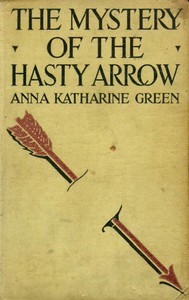The Mystery of the Hasty Arrow by Anna Katharine Green (phonics reader TXT) 📖

- Author: Anna Katharine Green
Book online «The Mystery of the Hasty Arrow by Anna Katharine Green (phonics reader TXT) 📖». Author Anna Katharine Green
"I am your wife, I, Ermentrude Roberts, married to you in the sight of God and man. I cannot prove it, but as you once said, our hearts know it and will continue to know it as long as either of us lives. But I am not going to obtrude my claims upon you, Carleton, or stand like a specter in your path. Had this woman you have deceived been weak or foolish or unloving, or indeed anything but what she is, I might have held to my rights and insisted upon a recognition which would have profited you in the end. But I cannot shame that woman—I can neither shame her nor bring her to grief. You have broken one heart, but you shall be saved the remorse of breaking two. I had rather suffer myself. I am alone in the world. I have means. I can ultimately be useful and face good men and women without fear. Why then should I drag down to the dust one as innocent as myself, or take from you what may make you the man I once thought you and hope to see you again. But that I may have strength for this and for all the sacrifices it involves, you must declare here, now, in this open park where we stand, with no one within sight much less within hearing, that I am your wife."
"You are my wife."
"It is enough. Now I can say what otherwise could never have left my lips. I love you, Carleton, love you to eternity as I promised; but I shall never seek you again, and you can go on your way unperturbed. I have consolations here," laying her hand on her breast. "It will no longer be my portion to watch your face for signs of a failing regard. What I have is mine, and that is the undying memory of two months of perfect happiness."
She would have said more, but she saw that he had been greatly shaken. She feared the renewal of a flame not yet altogether extinct in a heart which once beat for her alone, and so contenting herself with a low farewell, she was turning swiftly away, when one last thought made her pause and say:
"I cannot return you your ring. It is lost. I was careless with it and it fell unnoticed from my hand. But to-night I will send you back the little clock which unites our initials. Destroy it if you will, but if some sentiment bids you keep it, let it be this one and no other: 'I recall Ermentrude only that I may be faithful to Lucie.'"
With a low cry his head fell upon his breast in extreme self-abasement, then he slowly lifted his eyes and seeing in her face a full knowledge of his sin, murmured in overwhelming shame and contrition:
"You know me for the wretch I am. I have the ring; it fell from your hand into mine one day while you lay asleep. I do not ask for forgiveness, but this I promise you, Ermentrude:—if the little clock comes back, I will make a place in it for this ring, and neither clock nor ring shall leave me again while I live."
Instinctively her hands went out to him, then they fell back on her breast.
"God will hold you to that promise," she said; and melted away from his sight in the mist which had been gradually enveloping them without being seen by either.
Thus the struggle ended for him, which for her had simply begun.
Not till she found herself in the South with her girl friend, Antoinette Duclos, did she discover that the closest bond which can unite man and woman held her in spite of her late compact with Carleton Roberts. Should she reassert her rights and demand that the father should recognize his child? Her generous heart said No. The old arguments held good. She appealed to Antoinette for advice.
The result we know. When Antoinette's own child died at birth, she took Ermentrude's to her heart and brought it up as her own. There was little difficulty in this, as the Professor had already yielded to a Southern fever and lay at rest in a New Orleans cemetery.
And this brings us to another episode.
The widow in fact and the widow in heart stood face to face above a sleeping infant. They were both dressed for traveling and so was the babe. The dismantled rooms showed why. Young still, for the years of either's romance had been few, each face, as the other contemplated it, told the story of sorrow which Time, for all its kindliness, would never efface. But the charm of either remained—perceptible at this hour as perhaps it would never be again to the same extent. Antoinette basked in the light of Ermentrude's beauty ennobled by renunciation, and Ermentrude in that wonderful look in her friend's plain face which came at great crises and made her for the moment the equal of the best.
They had said little; and they said little now, as is the way of the strong amongst us when an act is to be performed which wrings the heart but satisfies the conscience.
The child was legitimate. It must not grow up under a shadow. To insure its welfare and raise no doubt in its own mind as it grew in knowledge and feeling, the two women must separate. No paltering with this duty, and no delay. A month of baby cries and baby touches might weaken the real mother. It should be now. It should be to-day.
But first, a final word—a parting question. It was uttered by Ermentrude.
"You will go back to France?"
"Yes. I can easily live there. And you, Ermentrude?"
"To New York. I shall never go far from him. But he and I will never meet. My world will not be his world. I shall make my own place."
"As Ermentrude Taylor?"
"As Mrs. Ermentrude Taylor. I am a wife. I shall never forget that fact."
"And the child? Will you never come to see it?"
Ermentrude's head fell and she stood a long time without answering. Then with a steady look she calmly said:
"I can think of but one contingency which might shake my resolution to leave her yours without the least interruption from me. If he—Antoinette, if he were left alone and childless, I might see my duty differently from now. You must be prepared for that."
"Ermentrude, when you send me this little shoe—See, I will leave one on and give you the other, I shall know that you are coming, or that you want the child. My life is yours as I once promised, and do you think I would hold back the child?"
And again their hands met as once before, in that strong clasp, which means:
"Trust me to the death and beyond it."
With Antoinette it was to the death, as we have seen. Warned by Ermentrude of the appalling results of their plan to bring father and child together, and entreated to fly lest her story should imperil the secret upon the preservation of which his very life now hung, she answered to the call as she had promised, and thus acquitted her debt though she failed to save him.
Of her previous act in disfiguring his photograph in her temporary lodging-place, we shall never know the full story. The picture had been hers for years, given her by Ermentrude on their parting, so that the child should not be without some semblance of her father even if she should not know him as such, and it was to secure this clue to their now doubly dangerous secret that Madame Duclos ransacked her baggage previous to her flight from the New York hotel. But whether its destruction in the peculiar manner we know was the result of simple precaution, or of a feeling of antagonism so strong against this destroyer of her beloved's peace, that it had to be expended in some way before she felt strong enough for that supreme sacrifice in his favor toward which events seemed hurrying her, may be known in Eternity but will never be told in Time.
And Ermentrude? What of her? Alone, robbed of husband and child and friend—where shall we look for her in this world of extreme tribulation? Search the hospitals of France where they press closest to the trenches. There will you find the woman who losing all has found much. Blessing and blest! the angel of the battlefield whom the bullets spare since her work on earth is not yet accomplished!
 Have you ever thought about what fiction is? Probably, such a question may seem surprising: and so everything is clear. Every person throughout his life has to repeatedly create the works he needs for specific purposes - statements, autobiographies, dictations - using not gypsum or clay, not musical notes, not paints, but just a word. At the same time, almost every person will be very surprised if he is told that he thereby created a work of fiction, which is very different from visual art, music and sculpture making. However, everyone understands that a student's essay or dictation is fundamentally different from novels, short stories, news that are created by professional writers. In the works of professionals there is the most important difference - excogitation. But, oddly enough, in a school literature course, you don’t realize the full power of fiction. So using our website in your free time discover fiction for yourself.
Have you ever thought about what fiction is? Probably, such a question may seem surprising: and so everything is clear. Every person throughout his life has to repeatedly create the works he needs for specific purposes - statements, autobiographies, dictations - using not gypsum or clay, not musical notes, not paints, but just a word. At the same time, almost every person will be very surprised if he is told that he thereby created a work of fiction, which is very different from visual art, music and sculpture making. However, everyone understands that a student's essay or dictation is fundamentally different from novels, short stories, news that are created by professional writers. In the works of professionals there is the most important difference - excogitation. But, oddly enough, in a school literature course, you don’t realize the full power of fiction. So using our website in your free time discover fiction for yourself. 




Comments (0)